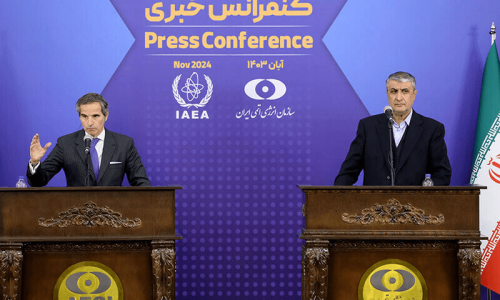KARACHI, March 9: Appre-ciating the role women played in the electoral process, retired Justice Nasira Iqbal said she was proud of the fact that women had raised their voices against ‘dictatorship.’
“I salute the people of Pakistan for their deep commitment to democracy, especially women who, despite threats, endorsed their verdict that they do not want dictatorship,” she said.
She was speaking at the launch of the book Voices and Visions: Young Writers from Pakistan, held at the Goethe-Institut here on Saturday.
Retired Justice Iqbal said she hoped the times to come would bring an improvement in the system of government and the societal set-up. She said that as Voices and Visions pertained to the subject of women, it made it even more significant that it was launched on International Women’s Day. She paid tribute to “all the women – past and present – in Pakistan, who struggled for peace and dignity.” She paid special tribute to former prime minister Benazir Bhutto, besides other politicians, homemakers, women factory workers, human rights activists and scores of others.
The retired justice said the onus was now on the political parties for good governance and a prosperous future of Pakistan. She requested the West – especially the US – to desist from interfering in Pakistan’s affairs. She hoped the struggle of the people of Pakistan to restore judges would be successful and added that the restoration of judges required nothing more than the “twinkling of an eye.”
Voices and Visions, a collaboration between the Goethe-Institut, Oxford University Press, and the Heinrich Böll Foundation, was the final product of the Young Writers’ Competition on Women in Pakistan, and comprised the best 20 works of the 600 originally received.
Justice Iqbal, patron of the competition, said that the book is a mix of diverse thoughts and charismatic writings. She urged the youngsters to continue enhancing their creative skills and encouraged them to write more.
Director Goethe-Institut Pakistan, Petra Raymond recounted briefly how the publication developed over the year, which marked the 60th year of Pakistan, 90th anniversary of German writer Heinrich Böll, and the Goethe-Institut’s 50 years in Karachi.
The judges for the competition were Prof Shaista Sirajuddin, Dean of Arts and Humanities and chairperson of the English department at the Punjab University, Prof Amberina Kazi, chairperson of the English department, Karachi University, and journalist Ghazi Salahuddin.
Ameena Saiyid of OUP explained how the selected young writers and poets attended a writers’ workshop to further hone their writing skills and their selected works.
Later, the writers gave a group recitation of Bol, a poem born out of their experiences of attending the workshop.













































Dear visitor, the comments section is undergoing an overhaul and will return soon.